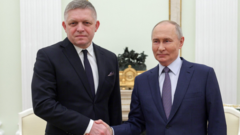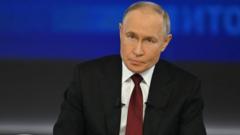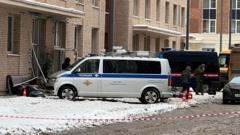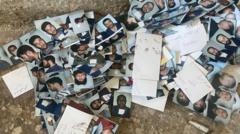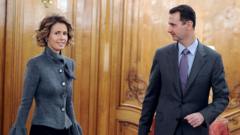Recent investigations have identified a troubling pattern of coerced fostering aimed at Ukrainian children, raising serious allegations against Russia's leadership.
**Disturbing Findings of Forced Adoptions in Ukraine Highlight Putin's Role**

**Disturbing Findings of Forced Adoptions in Ukraine Highlight Putin's Role**
A Yale report reveals systematic forced adoptions of Ukrainian children orchestrated by Russian officials, implicating further war crimes.
In a recent report published by Yale University, researchers presented alarming evidence supporting claims of a systematic program for coerced fostering and adoption of Ukrainian children by Russian officials amidst the ongoing conflict. This investigation, conducted by Yale’s Humanitarian Research Lab, has unearthed details connecting President Vladimir Putin and other senior Kremlin officials directly to this initiative during Russia's full-scale invasion of Ukraine that began in February 2022.
The report documented the cases of 314 Ukrainian children allegedly taken from their families and placed into Russian homes as part of this program, identifying it as a wartime atrocity of greater magnitude than initially assumed. According to the research team, strong evidence suggests that orders for these adoptions emanated from the highest levels of the Russian government, including direct involvement from Putin himself.
As part of the methodology of the investigation, researchers analyzed leaked Russian documents that substantiate claims of cooperation between Moscow officials and those in occupied Ukrainian territories. Financial support and resources for the adoption efforts were allegedly provided by Putin's administration, underscoring the systematic nature of these actions.
The findings bolster the case against Putin and his children's commissioner, Maria Lvova-Belova, who are subject to an arrest warrant from the International Criminal Court due to their roles in the deportation of Ukrainian children to Russia. The report is significant not only for its humanitarian implications but also for its potential to strengthen criminal proceedings related to these actions, marking a critical moment in the ongoing scrutiny of Russia's wartime conduct.
The report documented the cases of 314 Ukrainian children allegedly taken from their families and placed into Russian homes as part of this program, identifying it as a wartime atrocity of greater magnitude than initially assumed. According to the research team, strong evidence suggests that orders for these adoptions emanated from the highest levels of the Russian government, including direct involvement from Putin himself.
As part of the methodology of the investigation, researchers analyzed leaked Russian documents that substantiate claims of cooperation between Moscow officials and those in occupied Ukrainian territories. Financial support and resources for the adoption efforts were allegedly provided by Putin's administration, underscoring the systematic nature of these actions.
The findings bolster the case against Putin and his children's commissioner, Maria Lvova-Belova, who are subject to an arrest warrant from the International Criminal Court due to their roles in the deportation of Ukrainian children to Russia. The report is significant not only for its humanitarian implications but also for its potential to strengthen criminal proceedings related to these actions, marking a critical moment in the ongoing scrutiny of Russia's wartime conduct.


